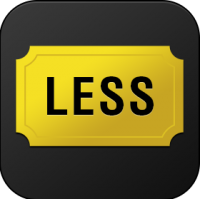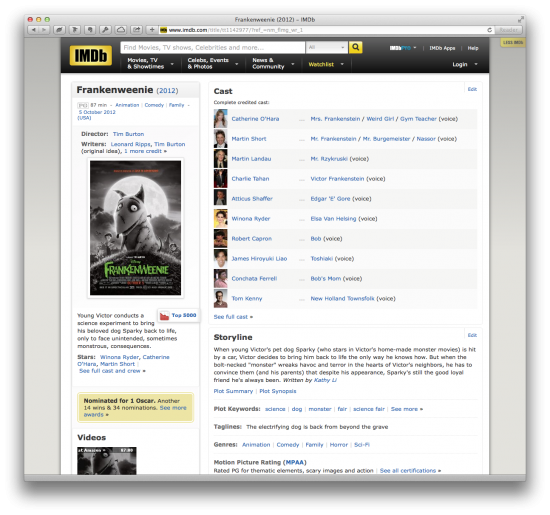 Less IMDb, our browser extension for making IMDb less cluttered and more useful, was the very first app we made. ((Is a browser extension an app? Debatable. There’s code and logic, and it has to be installed in an app-like way. But compared to Highland or Weekend Read, it’s not nearly as sophisticated. It falls into the murky area between web and app design, which is part of why it was a great first project for us.))
Less IMDb, our browser extension for making IMDb less cluttered and more useful, was the very first app we made. ((Is a browser extension an app? Debatable. There’s code and logic, and it has to be installed in an app-like way. But compared to Highland or Weekend Read, it’s not nearly as sophisticated. It falls into the murky area between web and app design, which is part of why it was a great first project for us.))
Here’s what I wrote [back in 2010](http://johnaugust.com/2010/less-imd):
> They’ve made it more difficult to do the one thing I come to IMDb to do: look at credits. New sections for photos, videos and trivia (star signs!) push credit lists below the fold, forcing you to scroll.
> Rather than complain about it, Ryan and I decided to fix it.
And it worked!
In the early days of browser extensions, Less IMDb became very popular because it did exactly one thing well: rearrange layouts to get rid of the cruft, letting you focus on the stuff you’re more likely to actually want.
Six years later, the little yellow tab remains in the upper-right corner of my IMDb windows, silently re-jiggering things. Remarkably, despite all the changes of technology, the extension still works.
Mostly.
Except on Firefox and Chrome.
And even on Safari, layouts will occasionally break spectacularly. IMDb pages aren’t static; you never quite know what you’re going to get. When IMDb reskins entire sections to promote a big summer movie, our little extension gets confused.
Getting Less IMDb back into fighting shape across multiple browsers will take a savvy web person 10 to 30 hours, and it’s just not a priority for us. We’ll be launching [Highland 2](http://quoteunquoteapps.com/highland-2-beta/) soon enough, and that occupies every brain cell of design and coding talent.
But reworking Less IMDb might be a great project for someone else, which is why today we’re releasing all of the source code for it with an MIT license. You can download it here:
[Less IMDb source code](http://qapps.s3.amazonaws.com/LessIMDb.zip)
Everyone is welcome to use this code to make their own version of the extension. And if one of those versions is great, we’ll even give you the name if you’d like it. (You can find us on Twitter: [@qapps](https://twitter.com/qapps?lang=en).)
I’m really happy we made Less IMDb. It set a great tone and mission for our company: making useful things we wished existed.
I hope someone takes up the charge and can give Less IMDb the love and attention it needs to go another six years.
